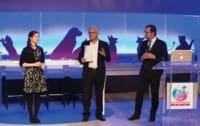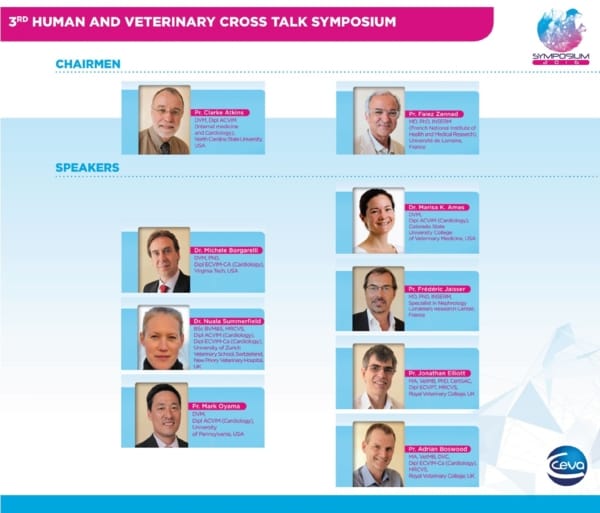Over 100 veterinary and medical experts from Europe, the USA and Australia met to share the latest developments and research findings in cardiology, nephrology and hypertension in cats and dogs. The event took place in Paris, at the Museum of Natural History, a classified historical monument.
The Symposium was chaired by Professor Clarke Atkins (North Carolina State University, USA) and Professor Faiez Zannad (Clinical Investigation Centre, Nancy, France), both renowned specialists and involved at international level in the writing of guidelines for the treatment of heart failure – in dogs and humans, respectively.
Seven internationally recognised specialists in cardiovascular disease shared their knowledge and expertise while a panel of seven other experts prepared questions for these speakers, contributing to highly stimulating discussions at the end of each session.
‘Dogs in stage B2 of heart failure are a very heterogeneous group,’ recalled Dr Michele Borgarelli (Virginia Tech, USA), speaking on the pre-clinical stage of mitral valve disease (MMVD). ‘Some of these dogs would benefit from early treatment. Certain multicentre clinical studies, such as the DELAY study, might help identify the impact and role of such treatment.’ Identifying which B2 patients would benefit from treatment is a challenge.
Dr Nuala Summerfield (Switzerland/UK) and Professor Mark Oyama (University of Pennsylvania, USA) addressed the hot topic of rational use of diuretics and diuretic resistance. ‘Signs of heart failure are not always caused by volume overload. So if diuretics are an essential part of first-line therapy, the aim should always be to use them with the lowest effective dose in order to minimise their adverse effects on renal function,’ she emphasized.
Professor Oyama presented several strategies to overcome diuretic resistance, which is associated with an increased risk of morbidity and mortality: ruling out owner non-compliance, using multiple diuretics, optimising their dosage, switching to other loop diuretics or to different routes of administration.
A thought-provoking session on mineralocorticoid receptors was then lead by two specialists of the matter, addressing it from both canine and human perspective, Dr Marisa Ames (USA) and Professor Frédéric Jaisser (Inserm, France), respectively. Dr Ames focused on aldosterone breakthrough (ABT). This occurs when the renin-angiotensin-aldosterone system cannot be blocked efficiently by angiotensin-converting-enzyme (ACE) inhibitors. ABT is common in dogs with heart disease treated with ACE inhibitors, according to Dr Ames, who found that it occurred in up to 40% of the cardiac canine patients she studied. Her study concluded that these patients might benefit from Mineralocorticoid Receptor Antagonists (MRAs), which block the detrimental effect of excess aldosterone.
Mineralocorticoid receptors are also particularly relevant at the moment in human nephrology, as shown by Professor Jaisser, a renal physiology specialist. ‘MRAs have a broad expression, well beyond the classical targets. Studies have shown they have a beneficial effect in renal disease and hypertension,’ he explained. These promising findings reinforce the interest of MRA in veterinary medicine.
Feline patients were also considered: Professor Jonathan Elliott (Royal Veterinary College London, UK), who leads different research projects on feline hypertension, shared his findings on the management of the hypertensive cat and the importance of early detection and management. ‘The correlation between age, chronic kidney disease and increased blood pressure in cats is now clearly established,’ he confirmed. Regarding treatment, he commented: ‘we have a very good drug for hypertensive cats: amlodipine.’
Finally, Dr Adrian Boswood (Royal Veterinary College London,UK) talked about the risks of the inappropriate use of diagnostic tests. An increasing number of tests are becoming available for vets, who must choose them wisely, he emphasised. ‘When choosing a diagnostic test, first ask yourself, whether the outcome will affect your diagnosis, prognosis or therapy. If not, this test is probably inappropriate for the patient.’
Each session was followed by a lively exchange between experts of the veterinary and human fields, and discussions continued during the social get-together.
It was the third symposium of its kind, with earlier editions held in 2009 and 2011 in Bordeaux. With these Cross-Talk Symposia, Ceva has created unique events, allowing the exchange between colleagues from veterinary and human fields, putting the benefits of a One Health approach into practice.
‘This Symposium is really one of its kind,’ commented Professor Atkins. ‘It brings together an interesting mix of physicians and veterinarians, cardiologists and nephrologists, from academia as well as private practice.’
‘This cross-talk format between human and veterinary medicine is absolutely unique,’ added Professor Zannad. ‘We learn so much from each other.’
By including topics on nephrology and blood pressure, this third edition had a wider audience and a broader scientific programme than previous editions.
>> Téléchargez la version PDF :

 Corporate Website
Corporate Website
 Africa
Africa
 Argentina
Argentina
 Asia
Asia
 Australia
Australia
 Belgium
Belgium
 Brazil
Brazil
 Bulgaria
Bulgaria
 Canada (EN)
Canada (EN)
 Chile
Chile
 China
China
 Colombia
Colombia
 Denmark
Denmark
 Egypt
Egypt
 France
France
 Germany
Germany
 Greece
Greece
 Hungary
Hungary
 Indonesia
Indonesia
 Italia
Italia
 India
India
 Japan
Japan
 Korea
Korea
 Malaysia
Malaysia
 Mexico
Mexico
 Middle East
Middle East
 Netherlands
Netherlands
 Peru
Peru
 Philippines
Philippines
 Poland
Poland
 Portugal
Portugal
 Romania
Romania
 Russia
Russia
 South Africa
South Africa
 Spain
Spain
 Sweden
Sweden
 Thailand
Thailand
 Tunisia
Tunisia
 Turkey
Turkey
 Ukraine
Ukraine
 United Kingdom
United Kingdom
 USA
USA
 Vietnam
Vietnam





